CRITICAL CARE TRANSPORT VITAL MINNIE HAMILTON SERVICE
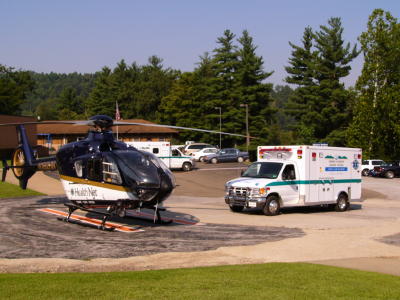
Variations of Critical Care Transport - Health Net and Minnie Hamilton
Health Care Critical Care Transport - Each use equally trained personnel
In Depth - The Critical Care Transport Program
The Need
In the past critically injured or ill patients in the rural areas of West Virginia, have had little options available to them when they required a continuity of care from one facility to another. The continued development of advanced and sophisticated therapies and techniques, the medical, nursing and EMS professions have enhanced the ability to monitor and maintain the physiologic requirements of the body in situations of extreme stress, illness, injury and compromise.
We also have the ability to intervene in situations where the patient has suffered severe, life-threatening insults while preventing irreversible damage. The primary goal is to offer patients a specialized and unique service to maintain or improve a patient's condition. The hospitals in this part of the state have had to wait up to four hours for a critical care team from Charleston to arrive. After the team has arrived it takes another ninety minutes to two hours to transport that patient from this facility to one of the major trauma or medical centers in West Virginia.
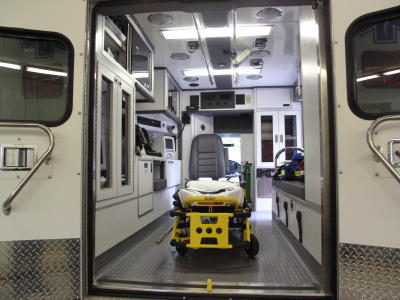
Room for the patient and a three member critical care team
The Training
Minnie Hamilton Health Care Center has taken the necessary steps to ensure that patients in this part of the state will receive the specialized care they need. Currently, MHHCC has three Paramedics and three Registered Nurses that have received the training and have been recognized as Critical Care Transport Paramedics and Registered Nurses by the West Virginia Office of Emergency Medical Services.
With the completion of this schooling our Critical Care team now has the training necessary to be able to transport the most critically ill or injured patient to a center that specializes in the care that they need. The Critical Care team is now able to care for Burn Patients, patients with critical Cardiac complications, they are able to insert advanced airway adjuncts and do emergency surgical procedures to ensure an airway for these patients, they also have the advanced training to care for patients with severe closed head injuries as is seen with ATV accidents that are so prevalent in our state. This Critical Care Team will also be available to transport patients from other hospitals in our region to advanced level of care facilities.
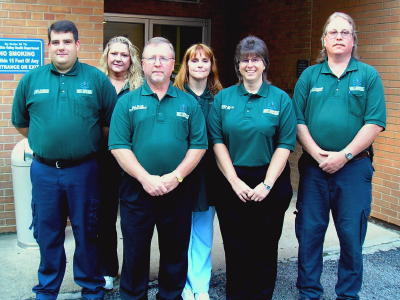
The Critical Care Team
Front L-R Paramedics Joshua Johnson and Bill Ellis
Sandra Ellis, RN, Phillip Deweese, Paramedic
Back L-R Melinda Sampson, RN, Kim Houchin, RN
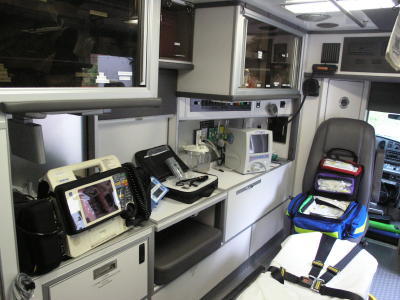
Fully equipped with advanced life support equipment
for neonatal, pediatric, child and adult patients
The Truck
In order for this to take place several pieces of equipment were needed to be put into service, with the first piece being a critical care transport truck. This truck is large enough to carry a three-person crew, the patient and the specialized equipment needed to monitor and treat the patient. Some of the equipment that will be put into service includes: a patient ventilator that will aid the patient when they are unable to breathe on their own. Advanced cardiac monitors that have the ability to "shock" a heart back into a beating heart and also have the ability to control the patient's heart rate.
Advanced invasive monitoring will enable the crew to monitor cardiac output, respiratory effort and cerebral pressure. There will be space to allow the crews access to all emergency medications and critical I.V. drips. This truck also is equipped with the ability to transport the critical pediatric patient in an isolett.
In conjunction with Critical Care Transports, this team and equipment will be utilized as a first response vehicle to respond to a mass causality incident such as a multi-vehicle accident and also respond with mutual aid to the outlying EMS agencies on the scene of a critically ill or injured patient. This team is also trained in hazardous material recognition and response and will have the capability to isolate and decontaminate patients.
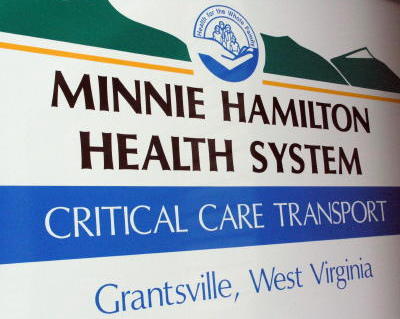
One of only a few Critical Care Transport Trucks in West Virginia
Minnie Hamilton Health Care Center is excited that with the help of grant funding from, The United States Department of Agriculture, West Virginia Department of Health, West Virginia Health Care Authority and the commitment of our staff we have been able to expand our services to provide this critical care.
- Minnie Hamilton Health Care Center Press Release